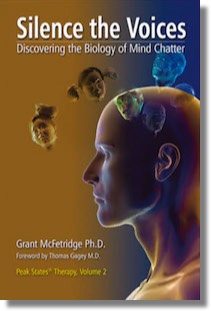Hearing Voices
'Voice Hearers'
Many otherwise perfectly well people suffer from an excess of this mind chatter. A typical person can suppress the problem to a lesser or greater degree - these people cannot. People in this condition are sometimes called 'voice hearers'. Sometimes they call themselves 'channelers'.
For non-voice hearers, it is hard to imagine what it is like to experience an uncontrollable barrage of voices in or around the head that nobody else can hear. Gina - a voice hearer who underwent the Silent Mind Technique in 2005 in Australia - described her experience prior to the treatment as "like having thirty drunk students camped out in the lounge room of her mind, yelling at each other while watching bad daytime TV" - see the testimonials for her description of the experience. It takes incredible fortitude to cope with what many people regard as relentless torture. The consequent effects of living with this condition for years can be debilitating to say the least.
Some people believe the voices to be part of them, others that the voices are demonic. Many can point to specific areas around the head where they perceive each voice originates from, each with its own emotional tone or personality. Others experience the voice as their own and centred in the head. Not all voices are regarded as problematic. One client wanted to keep his 'comical voice' because it made him laugh - that was until it continued to keep him awake at night. Whichever way the voices are experienced, it is possible to eliminate them with the Silent Mind Technique™. However, we understand that some people are attached to their voices and regard them as having value in their lives. We very much respect the right of the client to choose and will only help remove the voices with full consent and with full regards to the changes in life experience that the technique can facilitate.

Certified Peak States therapists are trained in a technique that gives the 'silent mind' state of being. It usually takes three or four sessions to be sure that the process is fully done and stable. SMT gives relief from the relentless barrage of thoughts, as if the client had been living in a noisy bar their whole life without realizing it. SMT is very helpful people who want to escape the endless stream of thoughts in their own mind, or for meditators who what to be free of their monkey mind. You then can actually think and pay attention far more easily, because these irrelevant, distracting thoughts are gone.
This technique helps clients in other ways, and is often used to solve other problems. For example, it eliminates the dysfunctional connections between people called 'cording' or transference and counter-transference. It also eliminates another problem we call the 'tribal block', and is the cause of the sensation that people from another culture feel 'differently' than your own.
For a more complete description of the Silent Mind Technique, why it works, and how it was developed, we refer you to the book Silence the Voices: Discovering the Biology of Mind Chatter (2017) by Dr. Grant McFetridge.
What to Expect in a Session
In the first session, we take a full health history and establish the way you hear the voices, obsessive thoughts, or simple mind chatter. We use standard trauma healing techniques to heal the originating trauma. We also make arrangements for follow-up healing should you experience any feelings of loss or loneliness when the voices are removed. If present, these feelings are usually very quickly relieved. After a session, clients sometimes report feeling tired, 'spacey' or very peaceful. This is a consequence of healing deep trauma. Therefore, it is good not to plan to rush away after a session. Ideally it is best to take a few minutes to relax and re-adjust after the treatment before driving or performing some other activity that requires your full attention.
Most of the certified therapists are competent in working with 'hearing voices'. Feel free to contact any therapist of your choice to ask for a treatment quote.
Patients with severe schizophrenia/ medication
Clients diagnosed with schizophrenia (i.e., more than just 'hearing voices') should plan on working with a therapist who specializes in this condition, as this is beyond the training level of most certified therapist. Plan on spending 3 nights in the vicinity of the treatment center - we can help you arrange accommodation locally. It's important that you have a support system in place when you undergo this treatment as the elimination of voices can be a big change. We usually won't treat a client with schizophrenia unless they are accompanied by a friend or relative and have people to support them when they arrive home. Follow-up appointments may be necessary after the treatment, and can be done with video conferencing or over the phone. Occasionally a further visit will be required.
• Therapist: Nemi Nath, NSW Australia

